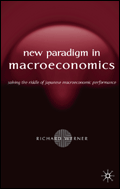|

 New Paradigm in Macroeconomics New Paradigm in Macroeconomics
Richard Werner
Prologue: Searching for a
New Kind of Economics
The dominant paradigm
In the 1980s and 1990s a school of thought reached the zenith of its power. Its influence had become pervasive. Having been the view of
only a minority little more than 20 years earlier, this approach had succeeded in dominating its discipline at all leading universities in the world. Academics that did not adhere to it
found it hard to make a career: obtaining jobs or moving up the ladder depended on publications in leading journals – which had been usurped by this particular school of thought.
But dominance in academia was merely the foundation of a much widerreaching influence. A large number of prominent national and international bureaucrats, journalists, politicians and other
‘opinion-makers’ had either been trained in the discipline or had otherwise become its followers. As a result, the views proposed by it came to dominate public policy debate by the mid-1980s,
permeating the discussion of issues affecting individuals, communities, companies, the nation and the international community.
This school of thought is better known by its key tenets than by
its name. Its key beliefs are that the pursuit of individual self-interest will lead to a better society, that government intervention beyond the narrow maintenance of law and order
should be minimized if not eliminated and that the powers of unfettered markets should be unleashed in virtually every part of society, at home and abroad. For this purpose, structural reforms
are recommended to deregulate, liberalize, privatize and open up as many industries and aspects of the economy as possible, as the beneficial forces of the invisible hand, if only allowed to
operate freely, would improve people’s lives, create wealth, produce prosperity and lead to maximum happiness.
The name of this school is less well-known: neoclassical
economics. This may have to do with its somewhat obscure or technical ring. It is also testimony to the extent of its dominance: proponents are often no longer aware that there could be
alternative schools of thought. To them, neoclassical economics is synonymous with modern economics per se. Most economics programmes at universities consist entirely of neoclassical
economics, and students can spend years studying for their degrees without becoming aware that they may have been studying just one particular branch, one of many schools of thought in the discipline of economics. More 

|
